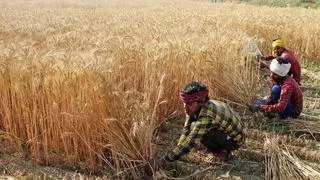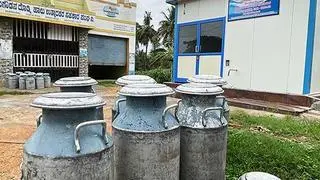Egypt’s public procurement agency General Authority of Supplies and Commodities (GASC) has expressed interest to import essential commodities such as wheat and sugar from India.
As a first step, it has requested that firms interested in supplying wheat to Egypt register with it through any local agent or representative, the Indian embassy in Cairo has said.
Indian firms will have to complete necessary procedures to be eligible to enter into a supply contract with GASC, it said.
Cairo team arriving on April 10
According to Agricultural and Processed Food Products Export Development Authority Chairman M Angamuthu, the details have been shared with active wheat exporters “to initiate the process of getting registration with GASC at the earliest”.
Angamuthu told BusinessLine that a trade delegation from Egypt will arrive in India on April 10 to get first-hand knowledge of the country’s phytosanitary regime, wheat production systems, grading, monitoring and control.
Besides, the team will learn about the storage systems, private and official inspection procedures and fumigation facilities. The delegation will be in the country until April 15 and tour Punjab, Madhya Pradesh and Gujarat, he said.
Change in import norms
Meanwhile, in what is being interpreted as a change in food import regulations, Cairo has said shipments into Egypt will have to comply with the requirements of the National Food Safety Authority (NFSA). Earlier, the General Organization for Export and Import Control was supervising imports.
NFSA has introduced a food consignment certification programme requiring imports to be verified for meeting the stipulations of Egyptian standard requirements by a conformity assessment body such as Intertek. One of the advantages of this change is that the inspections at the destination will be reduced.
Exporters said Egypt could relax quality norms to import Indian wheat. “No official statement has been made but it is likely that the norms for Ergot (infection and toxin produced a fungus) and foreign matter in the foodgrain could be lowered,” said an exporter.
Delhi-based exporter Rajesh Paharia Jain said “Egypt has no alternative but to relax the norms to get the required quantity of wheat. Till now, Egypt had been buying wheat from Russia and Ukraine.”
Russia, Ukraine share
The current Russia-Ukraine conflict has disrupted supplies to Cairo, which imports over 12 million tonnes (mt) over the last few years.
According to the US Department of Agriculture, Egypt has imported 62.6 mt of wheat over the last five year with Russia (59.7 per cent) and Ukraine (22.3 per cent) making up a combined 82 per cent.
Cairo buys wheat from Russia and Ukraine as prices are competitive, freight costs are low and the time taken for the consignment to reach Egyptian ports compared to other exporting nations is less. Last year, Russia and Ukraine made up 77 per cent of Egypt’s total wheat imports with the private sector importing 60 per cent and the government the rest.
Global prices
India has emerged as the best option in view of its competitive prices. Indian wheat prices are quoted at around $350 a tonne free-on-board (f.o.b). In comparison, the US and Europe are quoting above $410 a tonne and Argentina $396 a tonne f.o.b.
Currently, benchmark wheat futures on the Chicago Board of Trade are ruling at $10.35 a bushel ($380.30 a tonne). Prices have gained 10 per cent after Russian troops entered Ukraine on February 24. They have also surged on poor condition of the US crop.
Freight charges from India are lower compared to these destinations. On the other hand, India is trying to establish itself in the global wheat market and targeting to export at least one mt of the grain every month.
Its efforts come on the heels of a record 111.32 mt wheat production this year and the Food Corporation of India holding about 20 mt of wheat as stocks against the mandatory norm of 7.6 mt of wheat, including 3 mt of strategic reserves.
Last fiscal, India is estimated to have exported a record 7.5 mt of wheat. The record wheat exports has helped domestic prices rule higher than the minimum support price (MSP) of ₹2,015 a quintal. Currently, prices in Punjab and Haryana are at par with the MSP, but they are ruling higher at around ₹2,200 in Gujarat and Madhya Pradesh and about ₹2,050 in Uttar Pradesh.








Comments
Comments have to be in English, and in full sentences. They cannot be abusive or personal. Please abide by our community guidelines for posting your comments.
We have migrated to a new commenting platform. If you are already a registered user of TheHindu Businessline and logged in, you may continue to engage with our articles. If you do not have an account please register and login to post comments. Users can access their older comments by logging into their accounts on Vuukle.